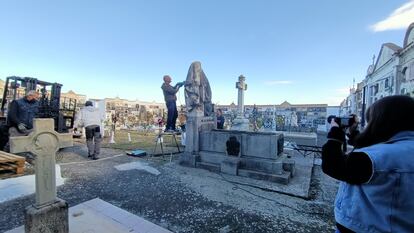Mass grave found beneath Francoist mausoleum in Spain
Nine people shot two months after the end of the Spanish Civil War lie under a monument to fascist politician José Maria Albiñana that was partly paid for by Francisco Franco


Josefina Barrón, otherwise known as Pepita, is the daughter of José, one of the nine prisoners shot in the town of Enguera, in Spain’s Valencia region, two months after the end of the Spanish Civil War. She was just over a month old when her father was taken away. “I have no memory of him,” she says.
On the morning of June 6, 1939, a squad from Spain’s fascist Falange party took all nine men out of the local jail. With their hands bound, the three councilors, two mayors, two politicians, a lieutenant and a prison officer were taken in pairs to the cemetery wall. A neighbor who was finishing milking saw them pass and greeted them discreetly: “See you in the afterlife,” replied one of the nine, according to testimonies later compiled by their descendants.
These men were the only ones executed in Enguera, the birthplace of Dr José María Albiñana, founder of the Spanish Nationalist Party – one of the first fascist parties in Spain – who had been executed at the beginning of the Civil War in Madrid, but was not buried until 1941. As he was considered a martyr, a mausoleum partly paid for by the dictator Francisco Franco himself, was erected in his honor. According to ground-penetrating radar, the monument containing his remains has stood on top of the grave in which the nine prisoners were buried for the past 80 years. This month, work has begun to exhume these men’s remains, after six of the nine victims’ families were granted permission by Albiñana’s relatives and Albiñana town hall, which is run by the conservative Popular Party (PP).
Now 82, Pepita is the only child of the executed men who is still alive. “One day he was taken from prison and was never heard from again,” she says. “I know he liked music and played the clarinet.” Her father worked in the textile industry alongside her mother, who took Pepita to settle in Aldaia, a town near the city of Valencia, when she was 10. “My grandparents never told me anything, they never talked about it,” she says.
Rafael Barberá, a relative of Salvador, another of the nine, also acknowledges that what happened in Enguera was cloaked in silence. “Even this morning my wife asked me again, ‘Do you really want to go and talk about this?’” he says. Barberá believes that the silence will be hard to break: “Even when all this is over, fear will continue to weigh on us.” He adds that, for many, the town became a hostile place: “Quite a few children and widows left Enguera for Tarrasa or Barcelona,” he says.
The son of Leandro was 15 the morning his father was killed. Remigio Payá, his great-nephew, says: “The Civil Guard made the son’s life impossible. They called him to the barracks, beat him up and insisted that he hand over the weapons his father had left him. He ended up leaving and never came back.”
Leandro was a town councilor from the Socialist Party (PSOE). During the Second Republic, he orchestrated the release of an Enguera resident who was imprisoned in Alicante, despite the fact this man was a sympathizer of the extreme right and against the Republic. “In spite of their political differences, Leandro went to declare that he was known to him and that he should be released. And, thanks to him and another comrade, he was,” says Payá. He adds that, in 1939, this same man filed the complaint that ended the lives of Leandro and the other eight men.
The cemetery wall against which they were executed is in a state of disrepair. “You could see the marks of the bullets before, but the wall is falling down now,” says Barberá, who points to the side of the cemetery where the father of one of those shot looked out in 1936 to find out if his son had been killed. Matías Alonso, president of the Group for the Recovery of the Historical Memory in the Valencia region, says the Enguera shootings were “only carried out to intimidate the people, because the war had already finished.”
Maybe that was the reason Miguel Sarrión, an elderly local who had been secretary of the Socialist Youth group in 1936, took more than 60 years to speak about what happened. “There is a grave with nine people shot in the cemetery. I know because I knew them all,” he told Alfredo Barberán, current coordinator of the Progressive Socialist Association of Enguera 10 years ago. “Once I started to investigate, to talk to people,” Barberán adds, “many knew the story. It had always been there.”
Even when all this is over, fear will continue to weigh on usRafael Barberá, a relative of one of the nine victims
Since Sarrión spoke out, Barberán has been working on reconstructing what happened that morning of June 6, 1939. In the town hall archives, he has found documents certifying the death of the nine. All died in “in the countryside” of natural causes, according to the official record: brain death, collapse, cardiac arrest... “They falsified the cause of death,” Barberán says. The youngest of the nine was not yet 30 and the oldest was 55.
What Sarrión did not know was that the grave in which Pedro, Leandro, Antonio, Salvador, Miguel, Ricardo, José, Emilio and Pedro were buried was paved over by the tomb and monument to Albiñana in 1941. It seemed to add insult to injury as Albiñana was an ultra-right-wing Hitler and Mussolini sympathizer, as he himself stated in the article Comrade Hitler that he published in the newspaper La Nación on May 4, 1932. In the posthumous tribute that the Franco regime paid to Albiñana, to which EL PAÍS has had access, it says: “The first blue shirts [armed militias akin to Mussolini’s black shirts] and the Roman salute [a gesture appropriated by fascism] were introduced to Spain by this dynamic Levantine.” Enguera still has a street that bears Albiñana’s name and which joins its town square to the town hall.
The permission of Albiñana’s relatives has been fundamental to the exhumation of the communal grave. None of his 21 great-nephews and nieces have objected to the removal of the mausoleum to allow for the removal and identification of the nine men’s remains. “This all caught us by surprise,” says a family source. “We are not closely related and, if there is a grave, it seems natural to allow the bodies to be exhumed.”
Raquel Canovés, daughter of Pepita and granddaughter of José, express their appreciation. “There is no other interpretation; it is humanity,” says Pepita. “I do not understand how these things can be politicized.”
Supposing the ground-penetrating radar is accurate, the exhumation will be completed in February, after which the mausoleum will be replaced. And in the middle of the cemetery, a marble sculpture will be erected as a tribute to those who were executed in the town and the bodies will be buried in that spot.
Tu suscripción se está usando en otro dispositivo
¿Quieres añadir otro usuario a tu suscripción?
Si continúas leyendo en este dispositivo, no se podrá leer en el otro.
FlechaTu suscripción se está usando en otro dispositivo y solo puedes acceder a EL PAÍS desde un dispositivo a la vez.
Si quieres compartir tu cuenta, cambia tu suscripción a la modalidad Premium, así podrás añadir otro usuario. Cada uno accederá con su propia cuenta de email, lo que os permitirá personalizar vuestra experiencia en EL PAÍS.
¿Tienes una suscripción de empresa? Accede aquí para contratar más cuentas.
En el caso de no saber quién está usando tu cuenta, te recomendamos cambiar tu contraseña aquí.
Si decides continuar compartiendo tu cuenta, este mensaje se mostrará en tu dispositivo y en el de la otra persona que está usando tu cuenta de forma indefinida, afectando a tu experiencia de lectura. Puedes consultar aquí los términos y condiciones de la suscripción digital.








































